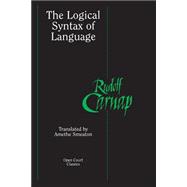
| Preface to the English Edition | xi | ||||
| Foreword | xiii | ||||
| Introduction | |||||
|
1 | (3) | |||
|
4 | (7) | |||
| PART I. THE DEFINITE LANGUAGE I | |||||
|
|||||
|
11 | (4) | |||
|
15 | (3) | |||
|
18 | (2) | |||
|
20 | (2) | |||
|
22 | (1) | |||
|
23 | (2) | |||
|
25 | (2) | |||
|
|||||
|
27 | (2) | |||
|
29 | (3) | |||
|
32 | (1) | |||
|
33 | (4) | |||
|
37 | (7) | |||
|
|||||
|
44 | (2) | |||
|
46 | (3) | |||
|
49 | (2) | |||
|
51 | (2) | |||
| PART II. THE FORMAL CONSTRUCTION OF THE SYNTAX OF LANGUAGE I | |||||
|
53 | (1) | |||
|
54 | (4) | |||
|
58 | (4) | |||
|
62 | (4) | |||
|
66 | (7) | |||
|
73 | (3) | |||
|
76 | (2) | |||
|
78 | (5) | |||
| PART III. THE INDEFINITE LANGUAGE II | |||||
|
|||||
|
83 | (1) | |||
|
84 | (3) | |||
|
87 | (1) | |||
|
88 | (2) | |||
|
|||||
|
90 | (4) | |||
|
94 | (1) | |||
|
95 | (1) | |||
|
96 | (2) | |||
|
|||||
|
98 | (4) | |||
|
102 | (4) | |||
|
106 | (4) | |||
|
110 | (5) | |||
|
115 | (2) | |||
|
117 | (3) | |||
|
120 | (1) | |||
|
121 | (3) | |||
|
124 | (5) | |||
|
129 | (2) | |||
|
131 | (3) | |||
|
|||||
|
134 | (2) | |||
|
136 | (4) | |||
|
140 | (2) | |||
|
142 | (2) | |||
|
144 | (3) | |||
|
147 | (2) | |||
|
149 | (4) | |||
| PART IV. GENERAL SYNTAX | |||||
|
|||||
|
153 | (3) | |||
|
156 | (4) | |||
|
160 | (2) | |||
|
162 | (3) | |||
|
165 | (2) | |||
|
|||||
|
|||||
|
167 | (3) | |||
|
170 | (2) | |||
|
172 | (3) | |||
|
175 | (2) | |||
|
177 | (3) | |||
|
180 | (2) | |||
|
182 | (4) | |||
|
|||||
|
186 | (3) | |||
|
189 | (7) | |||
|
196 | (3) | |||
|
199 | (1) | |||
|
200 | (5) | |||
|
|||||
|
205 | (2) | |||
|
207 | (4) | |||
|
211 | (3) | |||
|
214 | (3) | |||
|
217 | (3) | |||
|
220 | (2) | |||
|
|||||
|
222 | (5) | |||
|
227 | (6) | |||
|
|||||
|
233 | (4) | |||
|
237 | (3) | |||
|
240 | (3) | |||
|
243 | (2) | |||
|
245 | (2) | |||
|
247 | (3) | |||
|
250 | (6) | |||
|
256 | (1) | |||
|
257 | (3) | |||
|
|||||
|
260 | (2) | |||
|
262 | (2) | |||
|
264 | (3) | |||
|
267 | (4) | |||
|
271 | (6) | |||
| PART V. PHILOSOPHY AND SYNTAX | |||||
|
|||||
|
277 | (4) | |||
|
281 | (3) | |||
|
284 | (4) | |||
|
288 | (4) | |||
|
292 | (5) | |||
|
297 | (1) | |||
|
298 | (4) | |||
|
302 | (6) | |||
|
308 | (4) | |||
|
312 | (3) | |||
|
|||||
|
315 | (7) | |||
|
322 | (3) | |||
|
325 | (3) | |||
|
328 | (3) | |||
|
331 | (3) | |||
| Bibliography and Index of Authors | 334 | (13) | |||
| Index of Subjects | 347 |
The New copy of this book will include any supplemental materials advertised. Please check the title of the book to determine if it should include any access cards, study guides, lab manuals, CDs, etc.
The Used, Rental and eBook copies of this book are not guaranteed to include any supplemental materials. Typically, only the book itself is included. This is true even if the title states it includes any access cards, study guides, lab manuals, CDs, etc.